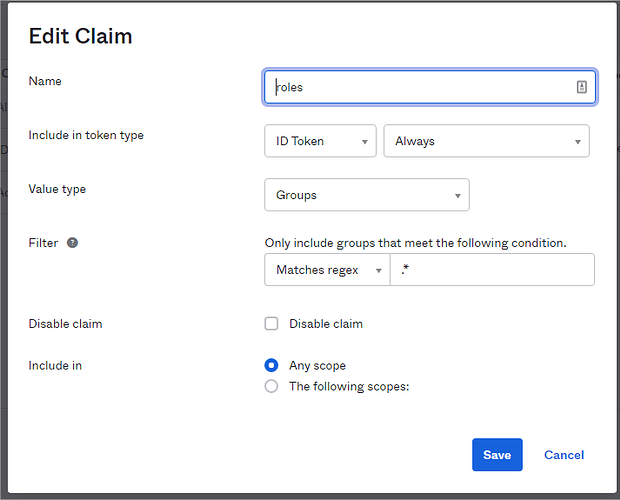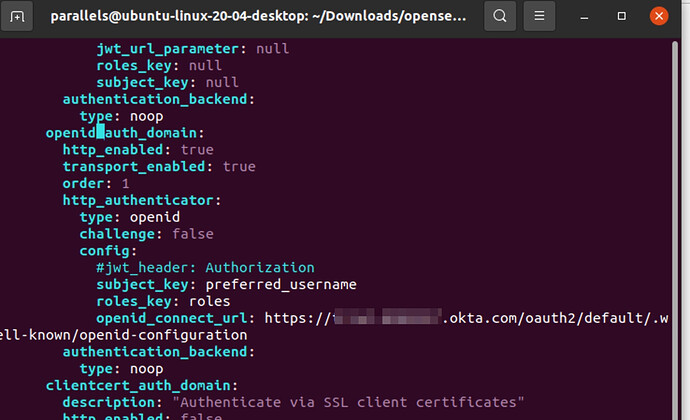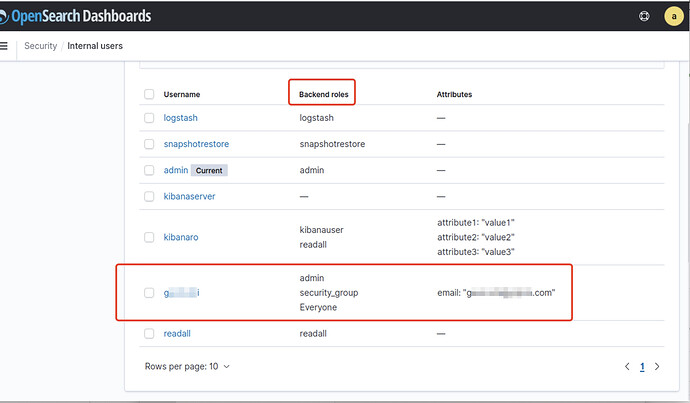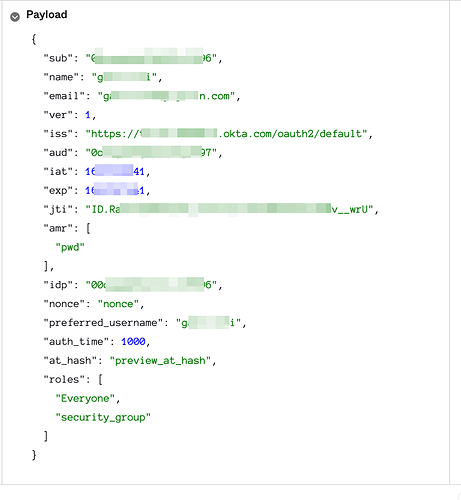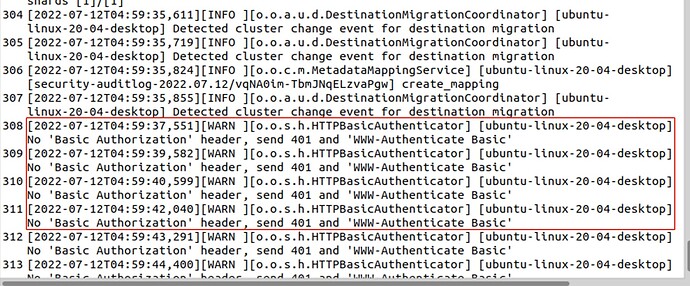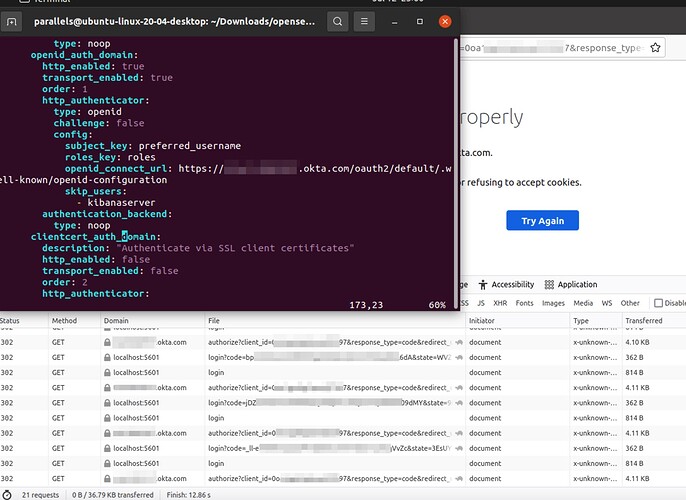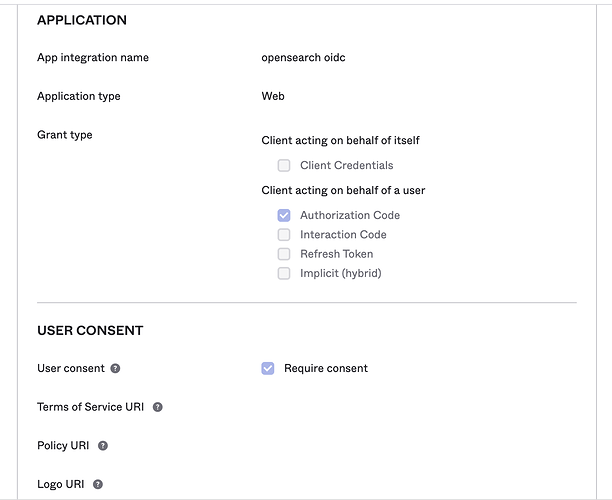Hi
the Openserarch version 2.0.1, I set as the document:OpenID Connect - OpenSearch documentation.
I visit the opensearch home page , it redirect to https://jp.test.com:5601/auth/openid/login?
and get the error:
{“statusCode”:401,“error”:“Unauthorized”,“message”:“Unauthorized”}
/etc/opensearch/opensearch.yml
# WARNING: revise all the lines below before you go into production
plugins.security.ssl.transport.pemcert_filepath: esnode.pem
plugins.security.ssl.transport.pemkey_filepath: esnode-key.pem
plugins.security.ssl.transport.pemtrustedcas_filepath: root-ca.pem
plugins.security.ssl.transport.enforce_hostname_verification: false
plugins.security.ssl.http.enabled: true
plugins.security.ssl.http.pemcert_filepath: esnode.pem
plugins.security.ssl.http.pemkey_filepath: esnode-key.pem
plugins.security.ssl.http.pemtrustedcas_filepath: root-ca.pem
plugins.security.allow_unsafe_democertificates: true
plugins.security.allow_default_init_securityindex: true
plugins.security.authcz.admin_dn:
- CN=kirk,OU=client,O=client,L=test, C=de
plugins.security.audit.type: internal_opensearch
plugins.security.enable_snapshot_restore_privilege: true
plugins.security.check_snapshot_restore_write_privileges: true
plugins.security.restapi.roles_enabled: ["all_access", "security_rest_api_access"]
plugins.security.system_indices.enabled: true
plugins.security.system_indices.indices: [".plugins-ml-model", ".plugins-ml-task", ".opendistro-alerting-config", ".opendistro-alerting-alert*", ".opendistro-anomaly-results*", ".opendistro-anomaly-detector*", ".opendistro-anomaly-checkpoints", ".opendistro-anomaly-detection-state", ".opendistro-reports-*", ".opensearch-notifications-*", ".opensearch-notebooks", ".opensearch-observability", ".opendistro-asynchronous-search-response*", ".replication-metadata-store"]
node.max_local_storage_nodes: 3
/etc/opensearch/opensearch-security/config.yml
_meta:
type: "config"
config_version: 2
config:
dynamic:
# Set filtered_alias_mode to 'disallow' to forbid more than 2 filtered aliases per index
# Set filtered_alias_mode to 'warn' to allow more than 2 filtered aliases per index but warns about it (default)
# Set filtered_alias_mode to 'nowarn' to allow more than 2 filtered aliases per index silently
#filtered_alias_mode: warn
#do_not_fail_on_forbidden: false
#kibana:
# Kibana multitenancy
#multitenancy_enabled: true
#server_username: kibanaserver
#index: '.kibana'
http:
anonymous_auth_enabled: false
xff:
enabled: false
internalProxies: '192\.168\.0\.10|192\.168\.0\.11' # regex pattern
#internalProxies: '.*' # trust all internal proxies, regex pattern
#remoteIpHeader: 'x-forwarded-for'
authc:
basic_internal_auth_domain:
description: "Authenticate via HTTP Basic against internal users database"
http_enabled: true
transport_enabled: true
order: 1
http_authenticator:
type: basic
challenge: false
authentication_backend:
type: internal
openid_auth_domain:
http_enabled: true
transport_enabled: true
order: 0
http_authenticator:
type: openid
challenge: false
config:
enable_ssl: true
verify_hostnames: false
subject_key: preferred_username
roles_key: roles
openid_connect_url: okta url/oauth2/default/.well-known/oauth-authorization-server
authentication_backend:
type: noop
ldap:
description: "Authenticate via LDAP or Active Directory"
http_enabled: false
transport_enabled: false
order: 5
http_authenticator:
type: basic
challenge: false
authentication_backend:
# LDAP authentication backend (authenticate users against a LDAP or Active Directory)
type: ldap
config:
# enable ldaps
enable_ssl: false
# enable start tls, enable_ssl should be false
enable_start_tls: false
# send client certificate
enable_ssl_client_auth: false
# verify ldap hostname
verify_hostnames: true
hosts:
- localhost:8389
bind_dn: null
password: null
userbase: 'ou=people,dc=example,dc=com'
# Filter to search for users (currently in the whole subtree beneath userbase)
# {0} is substituted with the username
usersearch: '(sAMAccountName={0})'
# Use this attribute from the user as username (if not set then DN is used)
username_attribute: null
authz:
roles_from_myldap:
description: "Authorize via LDAP or Active Directory"
http_enabled: false
transport_enabled: false
authorization_backend:
# LDAP authorization backend (gather roles from a LDAP or Active Directory, you have to configure the above LDAP authentication backend settings too)
type: ldap
config:
# enable ldaps
enable_ssl: false
# enable start tls, enable_ssl should be false
enable_start_tls: false
# send client certificate
enable_ssl_client_auth: false
# verify ldap hostname
verify_hostnames: true
hosts:
- localhost:8389
bind_dn: null
password: null
rolebase: 'ou=groups,dc=example,dc=com'
# Filter to search for roles (currently in the whole subtree beneath rolebase)
# {0} is substituted with the DN of the user
# {1} is substituted with the username
# {2} is substituted with an attribute value from user's directory entry, of the authenticated user. Use userroleattribute to specify the name of the attribute
rolesearch: '(member={0})'
# Specify the name of the attribute which value should be substituted with {2} above
userroleattribute: null
# Roles as an attribute of the user entry
userrolename: disabled
#userrolename: memberOf
# The attribute in a role entry containing the name of that role, Default is "name".
# Can also be "dn" to use the full DN as rolename.
rolename: cn
# Resolve nested roles transitive (roles which are members of other roles and so on ...)
resolve_nested_roles: true
userbase: 'ou=people,dc=example,dc=com'
# Filter to search for users (currently in the whole subtree beneath userbase)
# {0} is substituted with the username
usersearch: '(uid={0})'
# Skip users matching a user name, a wildcard or a regex pattern
#skip_users:
# - 'cn=Michael Jackson,ou*people,o=TEST'
# - '/\S*/'
roles_from_another_ldap:
description: "Authorize via another Active Directory"
http_enabled: false
transport_enabled: false
authorization_backend:
type: ldap
#config goes here ...
# auth_failure_listeners:
# ip_rate_limiting:
# type: ip
# allowed_tries: 10
# time_window_seconds: 3600
# block_expiry_seconds: 600
# max_blocked_clients: 100000
# max_tracked_clients: 100000
# internal_authentication_backend_limiting:
# type: username
# authentication_backend: intern
# allowed_tries: 10
# time_window_seconds: 3600
# block_expiry_seconds: 600
# max_blocked_clients: 100000
# max_tracked_clients: 100000
/usr/share/opensearch-dashboards/config/opensearch_dashboards.yml
logging.verbose: true
server.port: 5601
server.host: "0.0.0.0"
opensearch.hosts: [https://localhost:9200]
opensearch.ssl.verificationMode: none
opensearch.username: kibanaserver
opensearch.password: kibanaserver
opensearch.requestHeadersAllowlist: ["Authorization", "security_tenant"]
opensearch.ssl.certificateAuthorities: ["/etc/opensearch/root-ca.pem"]
server.ssl.enabled: true
server.ssl.certificate: /usr/share/opensearch-dashboards/config/jp.test.com.crt
server.ssl.key: /usr/share/opensearch-dashboards/config/jp.test.com.key
opensearch_security.auth.type: "openid"
opensearch_security.openid.connect_url: "okta url/oauth2/default/.well-known/oauth-authorization-server"
opensearch_security.openid.client_id: "0oa123456789R6697"
opensearch_security.openid.client_secret: "zCafdafdafdsfafsxcvxvdsdonf_dfadsaf-_V"
opensearch_security.openid.scope: "openid profile email"
opensearch_security.openid.header: "Authorization"
opensearch_security.openid.base_redirect_url: "opensearch url/auth/openid/login"
opensearch_security.multitenancy.enabled: true
opensearch_security.multitenancy.tenants.preferred: [Private, Global]
opensearch_security.readonly_mode.roles: [kibana_read_only]
# Use this setting if you are running opensearch-dashboards without https
opensearch_security.cookie.secure: true
Thanks



